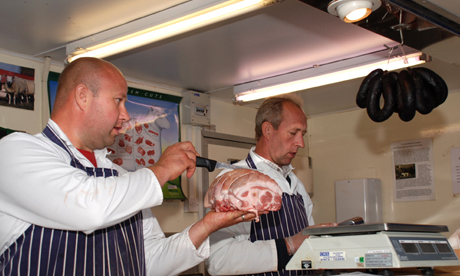Horsemeat provides food for thought says Hackney Friends of the Earth

Chris and Iain from Stocks Farm in Essex (organic and local). Note the black pudding dangling in the right hand corner. Photograph: Growing Communities
In some respects, we should be thankful for the pork and horsemeat scandal. If nothing else it reveals a dangerous disconnect between us, as consumers, and where our food comes from.
Many or most of the papers are concentrating on the undoubtedly disgraceful breach of cultural and religious customs, but we also left wondering if we can we really trust a global food system that rewards complacency at the expense of consumers.
Over the years, big supermarkets have driven down prices and consumers have become accustomed to spending a declining proportion of their income on food. But recently increasing food prices have reversed that trend, making it harder to make ends meet.
Price is the main driver of purchasing behaviour and other factors have become less significant as purse strings have tightened. And as fewer global food suppliers have become dominant, we have become increasingly dependent upon them.
Supermarket price wars have squeezed producer profits and big retailers have been dictating the terms of trade for decades. The pork and horsemeat scandal demonstrates that these pressures led to corners being cut.
Light touch regulation with fewer inspections at abattoirs, and food safety budget cuts across the board, have had disastrous consequences.
Given the tight margins at the lower value end of the food market it is almost inevitable that the cost of proper monitoring will be passed on to consumers.
This crisis shows the incredible complexity of the global food system and the long supply chains it relies on. Some horsemeat travelled halfway across Europe before arriving in the UK. But in fact, many ‘ordinary’ foods take even more roundabout journeys and come from further afield.
Recent events are a reminder that there are good reasons to source locally produced food when we can. Buying local can mean a closer connection to food, as we can buy directly from producers.
As the price of fossil fuels continue to rise, the cost of transportation and nitrogen fertilisers used in intensive farming methods will either be passed on to consumers or be paid by us all through environmental degradation.
Some argue that it would be wrong to stop importing food from developing countries because this would deprive their producers of income upon which those countries depend.
The reality is that many of the gains from international trade are concentrated in the hands of the few and the rules of the game are set by wealthy nations. It is a system of localised food production worldwide that would actually benefit the many.
In Hackney we are blessed not only with a diversity of food cultures and cuisines but also with great local food projects such as the award-winning Growing Communities.
The Capital Growth campaign lists 157 local food growing projects in Hackney. What better way to ensure that you know where your food comes from than getting involved and growing your own?
